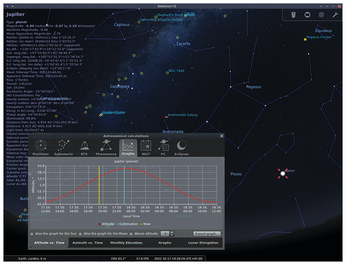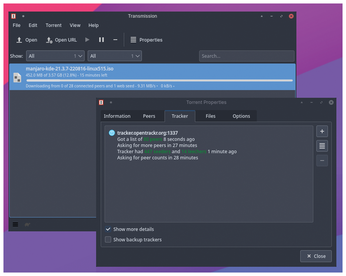FOSSPicks
Stellarium 1.0
Around 20 years ago, one of the first articles I wrote for a magazine was a roundup of Linux astronomy software. I was particularly enthusiastic about astronomy, and I was easily able to run through the popular tools of the time: Celestia, Xplanet, KStars, and Cartes du Ciel. I thought I'd done a good job. But a month went by, and the emails started to arrive. Why hadn't I looked at Stellarium? I was aghast. I'd forgotten to include what was, even then, the best space simulation on the Linux desktop. Twenty years later and I won't make the same mistake again. Stellarium has finally achieved a 1.0 release. It's a remarkable achievement that should be celebrated because Stellarium 1.0 is still the best open source space simulation on the Linux desktop or even on the macOS desktop, Windows, iPhone, Android, or a web browser. Stellarium is now everywhere.
For the uninitiated, Stellarium is a virtual planetarium that will simulate the night sky above you or any other place on Earth, either for tonight or any other time in the past or future. It's a celestial hot-body time machine that generates realistic renders of the sky, planets, nebulae, and other astronomical phenomena and can even approximate your local terrain and sky conditions. You'd think they'd have every feature covered by now, but 1.0 is still a major update. Most notably, Stellarium now uses Qt 6, with Qt 5 reaching the end of its supported life. The main view is also much improved, thanks to a new skylight model, and there's better dithering, observation lists, and high-DPI support. It's an incredible application, featuring the corona surrounding realistic eclipses, the rings around Saturn, and the moon's ever-moving terminus. It can help anyone understand the worlds above them, regardless of whether they have access to a telescope, a pair of binoculars, or even an unpolluted view of the night sky.

Project Website
BitTorrent client
Transmission 4
Transmission is another one of those projects that has been around for so long it's become part of the vocabulary. This is especially significant considering Transmission is a BitTorrent client, a technology whose popularity ebbs and flows almost as much as crypto. As Linux users, however, we have always had strong legitimate uses for BitTorrent because we often deal with both large files and projects that are self-funded and self-hosted. BitTorrent enables us to not only download those files without incurring hardship on the upstream project, but it also contributes in a small way by keeping a torrent seeding after a download has completed, helping other people access the same files. This is true whatever client you use, but for many of us, Transmission has been our cross-platform torrent client of choice.
More than adding new features, this major release focuses on consolidation. First in terms of performance and then with code clarity and future proofing. Thanks to an extensive campaign to test the performance of every bit of its code, the project has improved CPU performance by 50 percent and memory performance by 70 percent. Part of the same process was migrating the code from C to a much more standardized C++, with unit tests, safeguarding the project for the future. Even the project's approach to community has been rebooted, with promises of more engagement and no more tumbleweeds. There are a few tangible new features too, with new support for BitTorrent v2 using SHA-256 and hash trees, a new web client with mobile support, and more user-agent protection. There's still excellent desktop support, with both GTK and Qt clients, and of course you can still run it from the command line too. The end result is a BitTorrent client fit for the next 20 years, and one of the few independent protocols that thrives outside the increasingly controlled World Wide Web.
Project Website
https://github.com/transmission/

Buy this article as PDF
(incl. VAT)
Buy Linux Magazine
Subscribe to our Linux Newsletters
Find Linux and Open Source Jobs
Subscribe to our ADMIN Newsletters
Support Our Work
Linux Magazine content is made possible with support from readers like you. Please consider contributing when you’ve found an article to be beneficial.

News
-
Fedora Asahi 40 Remix Available for Macs with Apple Silicon
If you've been anticipating KDE's Plasma 6 for your Apple Silicon-powered Mac, then you're in luck.
-
Red Hat Adds New Deployment Option for Enterprise Linux Platforms
Red Hat has re-imagined enterprise Linux for an AI future with Image Mode.
-
OSJH and LPI Release 2024 Open Source Pros Job Survey Results
See what open source professionals look for in a new role.
-
Proton 9.0-1 Released to Improve Gaming with Steam
The latest release of Proton 9 adds several improvements and fixes an issue that has been problematic for Linux users.
-
So Long Neofetch and Thanks for the Info
Today is a day that every Linux user who enjoys bragging about their system(s) will mourn, as Neofetch has come to an end.
-
Ubuntu 24.04 Comes with a “Flaw"
If you're thinking you might want to upgrade from your current Ubuntu release to the latest, there's something you might want to consider before doing so.
-
Canonical Releases Ubuntu 24.04
After a brief pause because of the XZ vulnerability, Ubuntu 24.04 is now available for install.
-
Linux Servers Targeted by Akira Ransomware
A group of bad actors who have already extorted $42 million have their sights set on the Linux platform.
-
TUXEDO Computers Unveils Linux Laptop Featuring AMD Ryzen CPU
This latest release is the first laptop to include the new CPU from Ryzen and Linux preinstalled.
-
XZ Gets the All-Clear
The back door xz vulnerability has been officially reverted for Fedora 40 and versions 38 and 39 were never affected.

